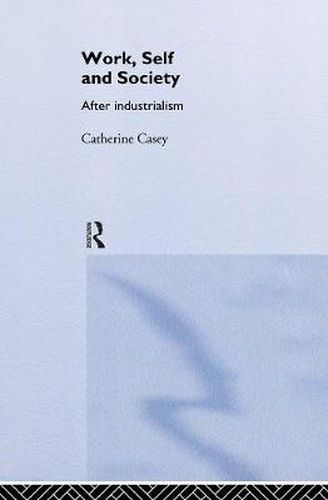Readings Newsletter
Become a Readings Member to make your shopping experience even easier.
Sign in or sign up for free!
You’re not far away from qualifying for FREE standard shipping within Australia
You’ve qualified for FREE standard shipping within Australia
The cart is loading…






Changes currently occuring in the world of work are large-scale, affecting what people do everyday and altering relations among ourselves and with the physical world. There is a shift in the nature of industrial work, from a materiality of labour and product, and specialization of function, to forms of production that are discursive, or symbolic, and highly integrated. Among the far reaching implications of a postindustrial condition is a dissolution of traditional and modern bonds of social solidarity and a metamorphosis of the character of the modern self. Work, Self and Society examines the relationships between the institutional practices of work under postindustrial conditions and the formation of the self. Drawing on data from field work in a multi-national corporation, the book critically analyses organzationa and cultural practices in contemporary corporate work. The author interprets the deliberate construction of designer cultures as a response to the broad crisis in industrial production, work and culture. The book also develops a critical social psychology of corporate work. It analyses the production of designer employees and other effects of contempora corporate culture, and describes and analyses self-strategies effected by the discursive practices of corporate work. The author argues that a post-occupational condition, and event precipitated and facilitated by new technologies and organizational change, is emerging in corporate organizations.
Post-occupational work has significant implications for self-identity and social cohesion within the work-place, and more broadly, in society. The relationships between the institutional processes of the new work in postindustrial corporate culture, and changes in social organization and self formation have not yet been described. Work, Self and Society: After Industrialism offers original analyses of these relationships, and proposes some important new categories by which to interpret the work, self society relation.
$9.00 standard shipping within Australia
FREE standard shipping within Australia for orders over $100.00
Express & International shipping calculated at checkout
Changes currently occuring in the world of work are large-scale, affecting what people do everyday and altering relations among ourselves and with the physical world. There is a shift in the nature of industrial work, from a materiality of labour and product, and specialization of function, to forms of production that are discursive, or symbolic, and highly integrated. Among the far reaching implications of a postindustrial condition is a dissolution of traditional and modern bonds of social solidarity and a metamorphosis of the character of the modern self. Work, Self and Society examines the relationships between the institutional practices of work under postindustrial conditions and the formation of the self. Drawing on data from field work in a multi-national corporation, the book critically analyses organzationa and cultural practices in contemporary corporate work. The author interprets the deliberate construction of designer cultures as a response to the broad crisis in industrial production, work and culture. The book also develops a critical social psychology of corporate work. It analyses the production of designer employees and other effects of contempora corporate culture, and describes and analyses self-strategies effected by the discursive practices of corporate work. The author argues that a post-occupational condition, and event precipitated and facilitated by new technologies and organizational change, is emerging in corporate organizations.
Post-occupational work has significant implications for self-identity and social cohesion within the work-place, and more broadly, in society. The relationships between the institutional processes of the new work in postindustrial corporate culture, and changes in social organization and self formation have not yet been described. Work, Self and Society: After Industrialism offers original analyses of these relationships, and proposes some important new categories by which to interpret the work, self society relation.